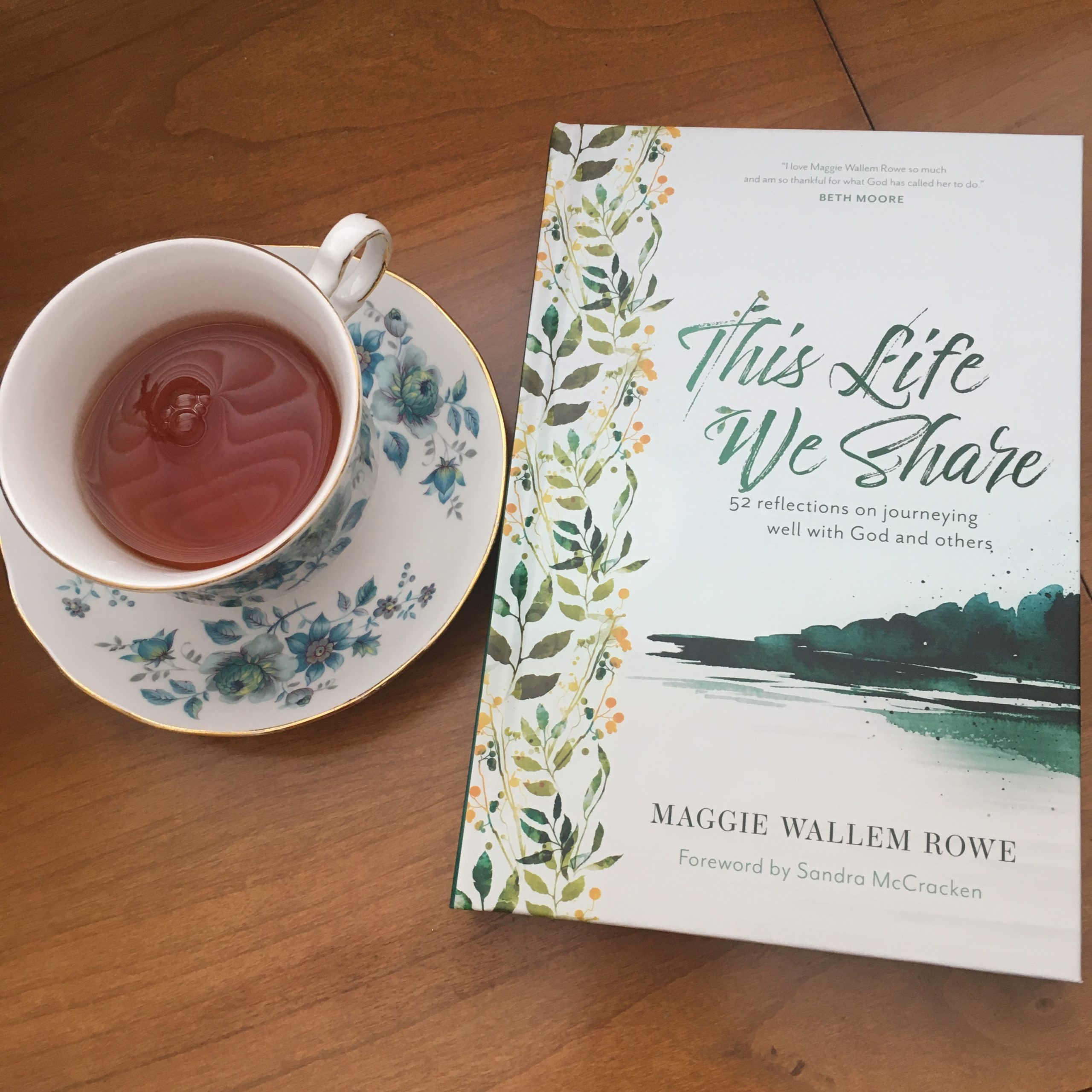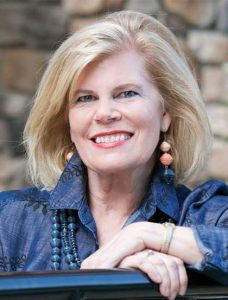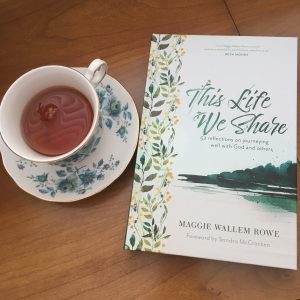Q&A with Maggie Wallem Rowe, author of This Life We Share

Friends, I’m delighted to introduce to you a favorite person of mine, Maggie Wallem Rowe. Though we’ve never met, I feel as though Maggie were a friend. I’ve known her for years as a publicist with Tyndale, where she was always the consummate professional and a delight to work with. Today, she is retired from that post and is now living in the North Carolina mountains with her husband, Mike. This Life We Share: 52 Reflections on Journeying Well with God and Others is her debut book.
KSJ: Maggie, welcome! First, I have to say—this is so fun. After years of knowing you as a publicist and working with you in that capacity, now I get to quiz you as an author in your own right. You’ve blogged frankly about the wonder of becoming a first-time author in your mid-60s. You inspire me to keep on reaching for big dreams, no matter how many candles decorate the birthday cake!
One of the things that most resonates with me about This Life We Share is your quest for authenticity. In my personal experience, I’ve found that younger women find emotional expression and authenticity easier than older women do. Forgive me for generalizing; of course, every individual is influenced by personality type, upbringing, and generational expectations. This is, however, my overall experience—but you are a marked exception to that rule. Why do you think you seek authenticity so intentionally when many of your generation are wary?
MWR: Katherine, that’s a perceptive question! I am almost 67, pretty ancient for a first-time author, but I’ve worked with younger women for my entire career, and I have learned so much from them. While I have many friends in my season of life, I also gravitate toward friendships with women in younger generations who are seeking mentors and are willing to mentor others in return.
In addition, I have always been one who has worn my heart on my sleeve. My emotions are too big to be contained in one body, so I write! I’m terrible at “faking fine,” so I simply don’t do it. I wrote This Life We Share for others who want to know they are not the only ones dealing with turbulent emotions, life challenges, and also unexpected joy!
KSJ: I love your book’s beautiful cover! It’s no secret that I’m a believer in judging a book by its cover, which is why covers matter. Tell us a bit about how your designer came up with this one.
MWR: It is gorgeous, isn’t it? I can say that because the credit totally goes to Art Director Jackie Noe Nuñez and her team, who came up with that concept. I live in the mountains of western North Carolina in a home called Peace Ridge, and the colors and atmosphere of this region (which the Cherokee call Shaconage, or “the land of blue mist”) influenced the choice of design. The intertwined leaves and berries on the border (on both the front and back of the hardcover) represent the interconnectedness of all women. Isn’t that lovely?
KSJ: Reading This Life We Share is very much like sitting down with a big sister, surrogate mom, or mentor and soaking up her advice. You cover a lot of ground within these pages. One thing I really appreciate about your book is how it’s organized. There’s an easy-to-navigate table of contents in which readers can see at a glance the topics you cover and flip immediately to those pages for insights. At the same time, you offer 52 succinct chapters, which means that if readers wish, they can meditate thoughtfully on one chapter a week for an entire year. What informed your decision to structure your book in this way?
MWR: Another great question! I can’t take credit for this, either. The beauty of being traditionally published, as opposed to working mostly solo as self-published authors do, is that I had the benefit of an entire team of people working collaboratively on This Life We Share. My acquisitions editor, Caitlyn Carlson, and her colleagues at NavPress are the ones who recommended that we break the book into four major sections: “The Inner Journey,” “The Intentional Journey,” “The Relational Journey,” and “The God of Your Journey.”
Once they suggested that, the rest fell into place. Although I wrote the book as 52 different reflections, it’s not truly a weekly devotional but rather a volume designed to speak to women’s needs in every season of life. It’s my prayer that women in college or just entering the workforce will find encouragement in these pages along with women in assisted living and every female in between.
KSJ: Another thing I most appreciate about This Life We Share is how careful you are to not burden women with any more “shoulds” than we already naturally carry. “Do what you can” is a big theme here. Can you expand a bit more on what this means for a woman when she’s really able to internalize and live out this truth?
MWR: Katherine, my husband and I served in pastoral ministry for 40-plus years, and honestly I never felt as if I could do enough as a pastor’s wife. My husband did not put that burden on me, nor, for the most part, did the churches we served. I am a perfectionist by nature, though, and I tend to judge myself more harshly than I ever would anyone else.
I’ve had to learn that the yoke Jesus speaks of truly is easy, and the burden is light. Despite what the ads would have us believe, women cannot do it all, nor should we. Jesus commended the woman who anointed him with perfume for doing what she could, and it’s all he asks of us today. I still preach this lesson to myself!
KSJ: Another significant theme is learning to define ourselves by what we have, not by what we lack. The result is the ability to live a peace-fueled life in which we can give to others out of our own inner abundance. Did this way of living come naturally to you, or did you (like most of us) have to learn it the hard way?
MWR: There’s a saying where I live in southern Appalachia that makes me laugh every time: “So poor I couldn’t jump over a nickel to save a dime!” Folks who grew up in poverty have learned to trust God for everything. There is an indomitable can-do spirit exhibited in many who have never lived in abundance.
When you think about it, there are very few stories in Scripture about people of affluence. Having a wealth of resources can sometimes make us spiritually poor. I grew up on a tenant farm in the rural Midwest, and I saw my parents trust God for everything. I’m grateful that God works with what we have and is not limited by what we lack. That’s been an important life lesson for me even when it comes to publishing. I may have penned the words to the 250-plus pages of This Life We Share, but it took a small army of editors, designers, marketers, and distribution team members to get it into the hands of readers. I am so grateful for the collaborative beauty of the body of Christ.
KSJ: Thank you, Maggie! What a delight this has been.
MWR: My pleasure, Katherine!
More about the book:
This Life We Share is a woman’s guide to living well―from the inner journey of dealing with anxiety and insecurity to the everyday moments of waiting and distraction to practical principles for parenting, grandparenting, and aging. Jesus once said of the woman who anointed his feet, “She did what she could” (Mark 14:8, NIV)―and that is the goal of this book: to provide insights and wisdom for walking through life with the confidence that you’re doing “what you can” to live well for God, love others, and take care of yourself.
Buy the book here.
More about Maggie:
Maggie Wallem Rowe is a national speaker, dramatist, blogger, and writer. She performs  original one-woman dramas and is passionate about connecting people to God and each other. Maggie lives near Asheville, NC, with her husband, Mike, where they love mountain dancing, bluegrass, and barbecue. The Rowes have three adult children and five grandchildren.
original one-woman dramas and is passionate about connecting people to God and each other. Maggie lives near Asheville, NC, with her husband, Mike, where they love mountain dancing, bluegrass, and barbecue. The Rowes have three adult children and five grandchildren.
Connect with Maggie at www.maggierowe.com.
Thanks to NavPress for providing me a copy of this book free of charge. All opinions are mine.


Katherine, I enjoyed reading this all over again. Thanks for having me over to your place today!
Always my pleasure, Maggie!